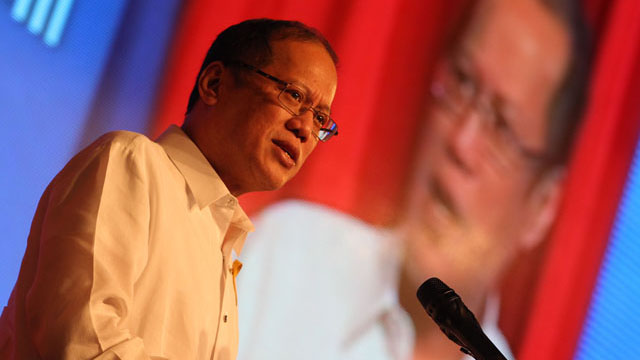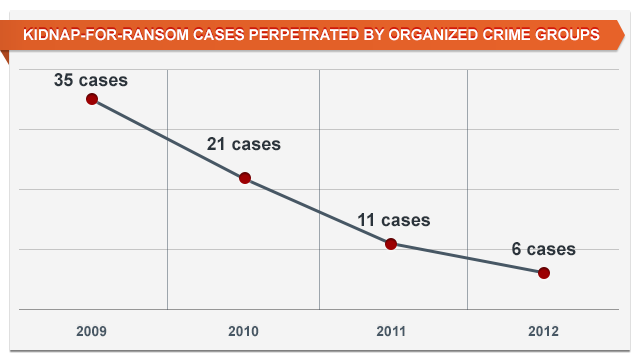SUMMARY
This is AI generated summarization, which may have errors. For context, always refer to the full article.

MANILA, Philippines – While there has been a 10% decrease in crime volume nationwide from 2011 to 2012, there were more crimes committed in Metro Manila, President Benigno Aquino III said Saturday, January 12.
Speaking at the 20th anniversary of the Movement for Restoration of Peace and Order (MRPO), Aquino also indicated he was lukewarm to the idea of new legislation involving firearms which contribute to an increase in the crime rate.
“Is the problem about licensed gun owners, or lawless elements? Will a total gun ban really deter kidnappers, murderers, and robbers, and terrorists from committing their crimes? Is it a question of passing new legislation, or of more strictly implementing existing laws?” he asked.
Stricter gun control measures were sought by concerned groups after a wave of violent incidents involving guns hit in the month of January alone. Two of them involved children, while a third one involved alleged members of a syndicate who were stopped at a joint police-military checkpoint in the province of Quezon.
“We have seen a revival in discussions on gun control, which largely revolve around new legislation on firearms, with some sectors advocating a total gun ban. This public clamor only deepens the necessity of discernment to determine if this will be the solution to the issue,” Aquino said.
Kidnap-for-ransom cases, he was told, have declined from 25 in 2011 to 11 in 2012. In 2009, cases perpetrated by organized crime groups stood at 35. This dropped to 21 in 2010, 11 in 2011, and, according to reports reaching Aquino, 6 in 2012.
The same decline was seen in kidnap-for-ransom cases perpetrated by terrorist groups, with only 5 recorded cases in 2012. This was an improvement from 25 in 2009. Specifically in Mindanao, kidnap-for-ransom cases declined to only 5 incidents in 2012, compared to 10 in 2011, due to “proactive efforts to promote community awareness and cooperation,” Aquino said.
Intensified police presence
The Anti-Kidnapping Group, or the AKG, of the Philippine National Police has arrested 29 personalities involved in kidnapping cases in 2012, all of whom have been charged for their crimes.
Aquino said the AKG also continues to work to prevent and solve kidnapping cases through a 3-pronged strategy that involves intelligence-gathering and sharing, conducting community awareness campaigns; tactical and strategic management of incidents; and the enhancement of investigation capabilities.
He added that police presence nationwide is being intensified, whether in support of communities, tourism, or other interventions to fight and prevent crime.
Through the “Pulis Nyo Po sa Barangay,” 31,596 of police officers have been deployed to supervise almost 40,000 barangays nationwide. 1,715 policemen are also manning tourism assistance centers and desks all over the country.
The local government department has been instructed to step up its campaign against loose firearms – especially as the May elections near. “The issue of loose firearms is an important component of our fight against criminality,” Aquino declared.
Armed groups
Private armed groups are being targeted by authorities. The campaign has yielded 249 firearms, even as over a hundred individuals belonging to these armed groups have been put in jail.
This campaign is being complemented by “Oplan Katok,” which involves policemen visiting houses of identified holders of expired firearms licenses. The drive seeks to have these licenses renewed, or the firearms surrendered.
Aquino said more than 25,000 house visitations have already been conducted, and all PNP regional directors have been ordered to complete visitations in their areas of responsibility by Saturday, January 12.
Yet much remains to be done, Aquino admitted, given the rising crime volume in the metropolis. He pointed out however that the increase could be attributed to a new method of reporting crimes in the National Capital Region.
“We are looking for solutions that are strategic, rational, and effective. In the national discussion that is taking place today, your perspectives are more than welcome. After all, your movement was founded on the basic premise that law enforcement officials and the citizenry must empower each other; that both the private and public spheres must take active roles in keeping our communities safe and peaceful,” Aquino told members of the MRPO led by anti-crime advocate Teresita Ang-See. – Rappler.com
Add a comment
How does this make you feel?

There are no comments yet. Add your comment to start the conversation.